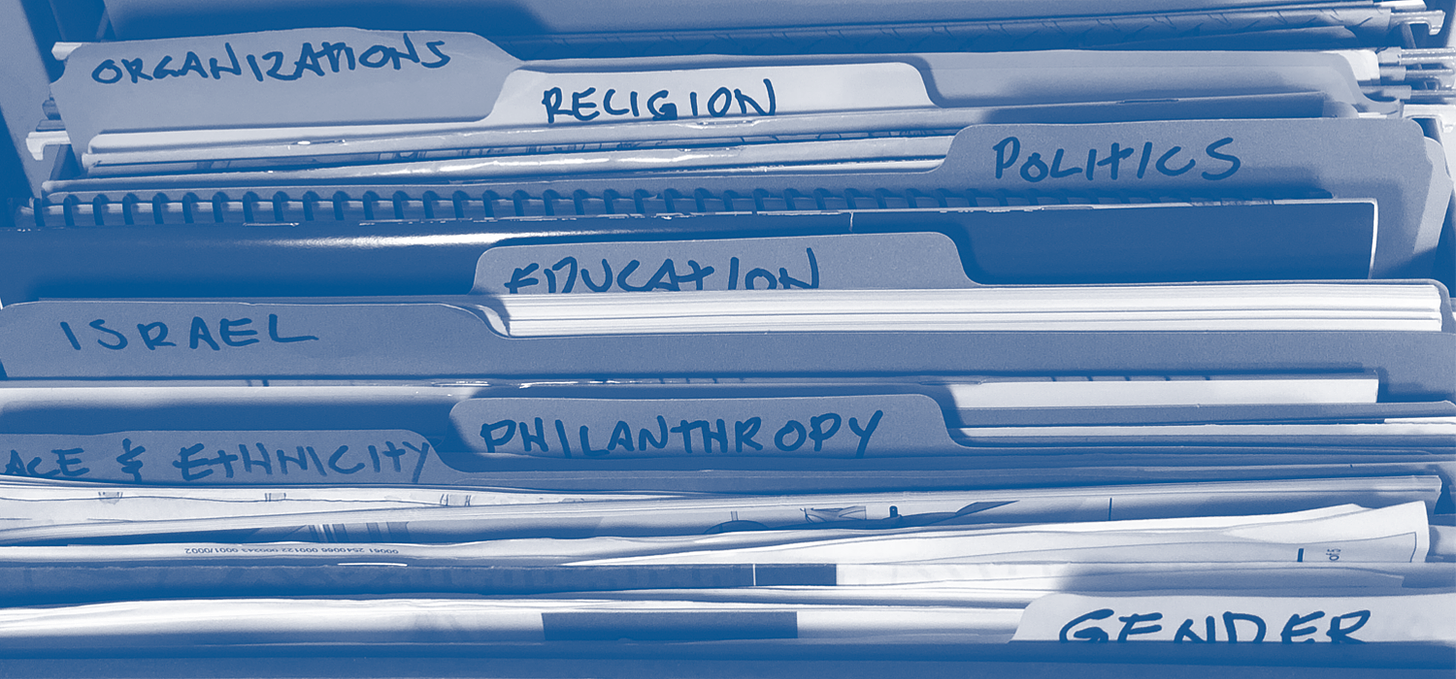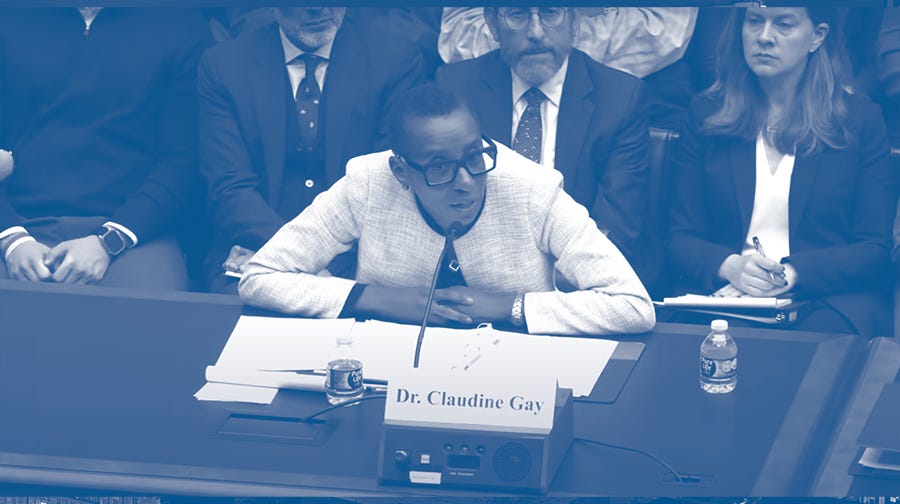Hello and welcome to the December edition of the Documensch Newsletter. With a war raging in Gaza, antisemitism raging globally (including here in the US), and the ongoing, simmering shifts around almost every political, economic, and environmental issue, it has been a difficult year. The work we do at the Berman Archive has been a silver lining—documenting American Jewish communities as they navigate this tumultuous time is something tangible and useful we can do to help our users understand this moment.
As part of that effort, we share 6 documents that anchored the Berman Archive’s year. We also share some archive-related observations from this year’s Association for Jewish Studies Conference in San Francisco. Finally, we analyze the Harvard, MIT, and U Penn college presidents’ testimony before congress earlier this month and place their remarks in the context of our broader collection of college statements since October 7.
Thank you for joining us this year as we explored American Jewish communities, past, present, and possible. We have a lot in store in 2024, so please stay tuned. As always, reach out with feedback, suggestions of articles we should consider sharing, or ideas for documents we should consider archiving. We can be reached at bermanarchive@stanford.edu.
Onward,
-Ari
Ari Y Kelman, Director, Berman Archive
A Year in Documents

It has been a year. From labor upheavals, to violence in Israel, to war and death in Gaza, to a heated war of words here in the US, Jews have been at the center of this global inflection point. Throughout 2023 we worked to connect our holdings with contemporary Jewish American discourse. We were heartened and enlightened by the many ways our records pointed to past antecedents that helped us contextualize the present moment. What follows are the 6 documents that defined, framed, or informed the year for us. We hope you’ll join us in 2024 as we continue to explore the American Jewish past in the present.
1. Hot Labor Zummer
This summer, when the Screen Actors Guild entered the Hollywood strike fray, Jewish actor and Guild President Fran Descher became a bit of a folk hero and the face of the insurgent labor movement out on the West Coast. Of course, Jews have had a long history with the US labor movement. The Berman Archive holds the 1976 bicentennial issue of the American Jewish Historical Quarterly which is dedicated to the topic of American Jews and the labor movement. From historiography of Jewish labor to the “wandering jew” of American socialism, this issue covers a lot of solid(arity) ground.
2. Jewish Women Make History
Judith Rosenbaum, the CEO of the Jewish Women’s Archive, contributed an exploration of many records within the Berman Archive testifying to Jewish women’s roles in shaping communal institutions and discourse. She highlighted an incredible document from 1893 by Ray Frank, the first Jewish woman to preach formally from a pulpit in the United States. In “Women in the Synagogue,” Frank calls on Jews to center womanhood, mothers, and the home as a site of the practice of Judaism. This sentiment feels especially relevant post October 7 when many Jews turned to Sharon Brous—rabbi of the Ikar congregation in Los Angeles—for moral and spiritual guidance. Brous’ leadership and sermons implored us to maintain our humanity by honoring the humanity of those who suffer in Palestine and Israel alike. Thanks to Rosenbaum’s dive into the Berman Archive, we’re able to see the ways leaders like Brous might be connected to the efforts of Frank who had a voice rare among women and Jews.
3. Meeting the Moment
Shortly after October 7 we put out the call for people in the American Jewish community to share emailed statements by American organizations—both Jewish and not Jewish—public figures, schools and educational institutions, universities, synagogues, non-profits, and political groups of various types. We’ve been heartened by the response and ask that you keep sending emails our way. We are in discussion with other libraries and archives about how best to make this vital resource accessible. Stay tuned for more updates on our October 7-related collection and archive work in the coming months.
4. Statements from Colleges and Universities
The Berman Archive is committed to the ongoing documentation of American Jewish communities in this tumultuous time. Using Hillel’s list of the top US colleges by Jewish population, we have collected all the available University statements relating to October 7 and its aftermath in order to document the campus climate as it relates to, speaks to, or overlooks the Jewish experience of their students and stakeholders.
5. Forward Currents
On October 11, the Berman Archive hosted our first event, Jewish Media in America, featuring the leaders of Jewish Currents, the Forward, and J. The Jewish News of Northern California. It was fortuitous, helpful, and heartening to have the opportunity to grapple with the question of how to talk about the war in real time, guided by some of the key shapers of American Jewish discourse.
6. Manufactured Dissent
Finally, in a year that felt like Peak Statement, we found some interesting examples of past statements as they relate to Jews and the American Jewish community more specifically. It’s clear that the conversations happening today around antisemitism and Israel have been going on in America for generations. Our oldest example comes from 1928 letter from Henry Ford to the American Jewish Committee disavowing and distancing himself from antisemitic statements made in his name at publications he owned. Sounds familiar.
The Archive Scene at AJS

December brings Hanukkah, time off, and the annual Association for Jewish Studies Conference. This year it was in San Francisco, and while Berman Archive Director Ari Y Kelman participated in a number of panels, Deputy Director Adam Jacobson took in all the archive-related panels. —> Read the Highlights
Failing the Testimony

The Berman Archive has been tracking the discourse and documents that have proliferated in the wake of October 7. A central site of contention has been colleges tasked with the responsibility of ensuring that what they write or say is supportive of both student safety and the protection of free expression. However, in recent testimonies before Congress on December 5, the presidents of Harvard, the University of Pennsylvania, and the Massachusetts Institute of Technology (MIT)—Dr. Claudine Gay, Elizabeth Magill, and Sally Kornblunth, respectively—were scrutinized for “lawyerly responses to questions about whether they would discipline students who called for the genocide of Jews,” according to the NY Times. Given our extensive collection of US College statements, Berman Archive Fellow Willow Herz offers an analysis of each president’s remarks compared to the public statements of their respective universities. —> Read Our Full Testimony Analysis
